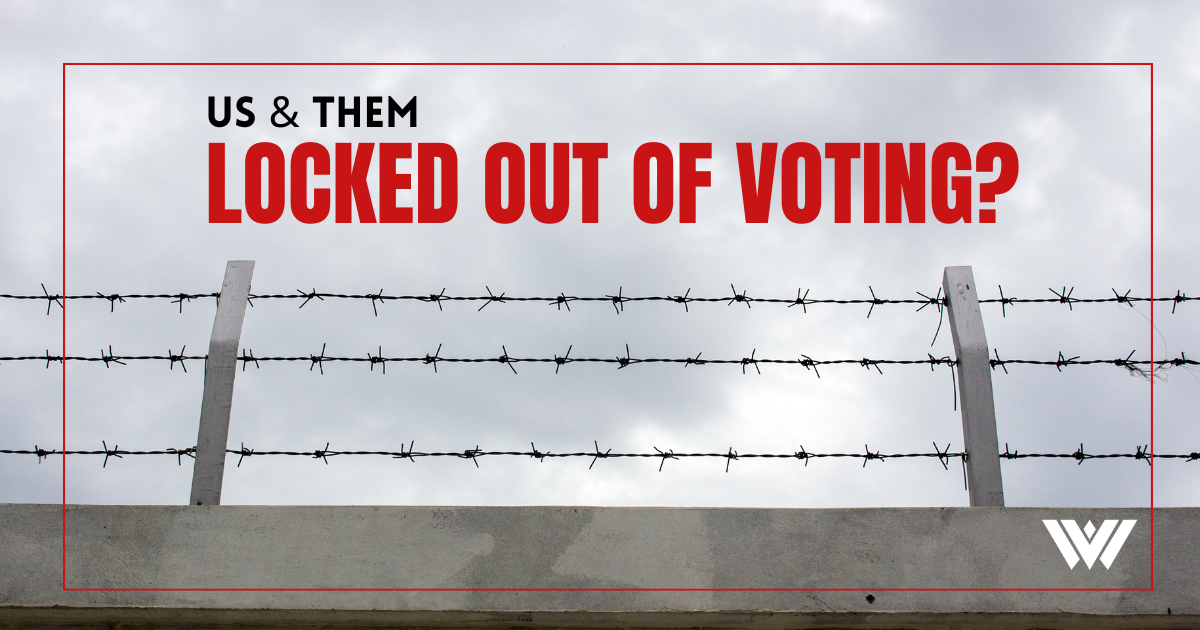More than 4.5 million Americans cannot vote because of a felony conviction but only about a quarter are currently in prison.
On the newest episode of Us & Them, host Trey Kay talks with people who support expanded voting rights for felons, and those who say people who’ve committed crimes should forfeit their rights until they serve their entire sentence, including any probation or parole.
Felon disenfranchisement laws differ significantly from state to state and even legal experts say it can be difficult for someone to know their rights. In a few states, a person can vote from prison, while in others, voting rights are restored upon release or completion of parole or probation. Despite recent trends to expand voting rights, some states are moving in the opposite direction. In Florida, voters passed an amendment to restore voting rights to most people with felonies, but lawmakers passed a new law requiring that people pay all of their court fees first. And in Virginia, only the governor can restore the right to vote for someone convicted of a felony.
This episode of Us & Them is presented with support from the West Virginia Humanities Council and the CRC Foundation.
Subscribe to Us & Them on Apple Podcasts, NPR One, RadioPublic, Spotify, Stitcher and beyond.
“I started life over, I’m living as a productive citizen. I work for the food bank. I’m trying to give back to the community at the same time, as well as feed myself. Like, I’m back into society, I should be able to be a part of society … That’s what our politics and our whole system is off of. [It’s] supposed to be equality … But it feels even less than now because my voice is completely silenced in that matter.”
— Anthony Cole
Photo Credit: Trey Kay/West Virginia Public Broadcasting
“Everyone should be able to have a say in who governs them, and everyone should be able to be represented, no matter how they choose to exercise that right when it comes to an election.”
— Sara Carter
Photo Credit: Brennan Center for Justice
“There is absolutely no way to talk about voting rights in the United States without talking about the fact that the United States has the highest incarceration rate in not only the world but in world history. We know that incarceration is not sprinkled randomly through the society, it’s not just that men are overwhelmingly more likely to have criminal records. It’s that racialized men are more likely to have criminal records, because of the ways in which we understand crime … It’s also about poverty and class. It’s poor men that go to jail, they go to prison. We absolutely know that class divisions very much predict voting divisions.”
— Natalie Delia Deckard
Photo Credit: University of Windsor
“They have violated the state code, they have committed a criminal offense. And they have shown that they are not worthy at that time, they’ve done something to go against the people of the state of West Virginia. And so we wouldn’t want people who are committing crimes to then be a part of a system that would allow them to vote for someone who may then decide to change and say, ‘These criminal offenses are OK.’ It serves as a deterrent value. So people know that they lose those rights when they commit an offense. And, again, this is just part of the criminal justice system. We all want them to be a part of society, again, with voting rights, but we want them to serve their time for the crime that they committed. There is no effort to suppress votes or to keep somebody from voting.”
— Mac Warner, West Virginia’s Secretary of State
Photo Credit: Trey Kay/West Virginia Public Broadcasting
“I know that we live in a period of time, where there’s a heavy emphasis on criminal rights. I support that, too. We’ve got to make sure we treat folks humanely, that we try to be in the business of rehab and rehabilitation and treatment, especially when it comes to the drug scourge. But I’m focused on victims. …I fully support the idea of the restoration of rights, but after you’ve served your entire penance, to society … and that means … not only your time behind bars, but your period of supervised release, if there’s a period of probation, it’s at the end of that entirety, that you ought to get the restoration of rights. West Virginia already does this today. I just think I’m one of those folks that truly believe that there’s a purpose to punishment, we don’t do it to hurt people. We do it for the rehabilitation part … they’re not part-time, or lesser citizens because they don’t have the right to vote. And we didn’t take that right from them. They took it from themselves when they committed the heinous crime, whatever crime it happened to be.”
— Mike Stuart, WV State Senator
Photo Credit: Trey Kay/West Virginia Public Broadcasting
“I opened the card … and I held it in my hand, and I just looked at it and I’m like, ‘I have arrived.’ It was a really emotional moment for me. I cried because I felt like I belonged again. Like I can contribute again. Like this is my ticket back into the forefront of society and not just necessarily in the shadows or in the underbelly.”
— Autumn McCraw
Photo Credit: Trey Kay/West Virginia Public Broadcasting
